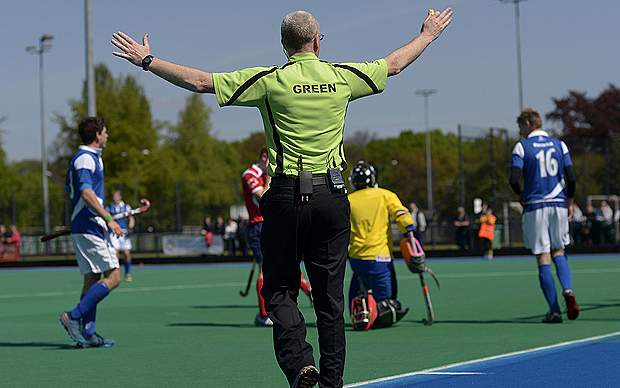David Ellcock takes a look at the role of the hockey match official
Most of you will be aware that there is a match official (MO), or as they often erroneously called, a ‘TD’, appointed to every English national league game, but what are they there for and what do they do?
Continue reading...

Unlock our ad-free, premium content and get use of our subscriber-only app. Use coupon 3FOR1 to get 3 months for only £1!
Already a subscriber to our website? Login
The MO’s role, at its simplest, is designed to take much of the pressure around running a game of hockey off the shoulders of the umpires, to leave them to concentrate on the match itself.
On arrival at the ground, usually an hour-and-a-half to an hour before start time, the MO will introduce themselves to the two managers and the umpires and check that there are no issues. Should one of the umpires fail to show up – thankfully a very rare occurrence – the MO has the responsibility to try and find a suitable alternative umpire, who must be at least an active Level 2 umpire and must also be acceptable to both teams.
Assuming that all is well, the MO will then ask the two team managers for their squad lists for the day and a copy of their photographic list of registered players. Having checked that all the players listed to play are appropriately registered, the names are then transcribed onto the match report form.
Once the paperwork is complete the MO will go and check that the pitch is set up appropriately – that the nets are in good condition, corner flags are in place etc. Shortly before the game a discussion will be held with the umpires to agree issues such as timing of disciplinary cards, dealing with overly vociferous benches and so on. At this point the MO will also inform the umpires what length of half-time break has been agreed.
When the game is underway the MO has four main jobs. Firstly, to control all substitutions to ensure that they are carried out in line with the rules of hockey along with noting the time that each substitute first enters the field of play.

Secondly, to work with the team managers to ensure that the bench personnel behave appropriately and to tae action – usually in conjunction with the umpires – if this is not the case. Thirdly, to record the time of all goals scored and to note their type – field goal, penalty corner or penalty stroke. Fourthly, to time all temporary suspensions and to return the suspended players to the field of play when their suspension is over.
At the end of the game, the MO is required to complete the match report form, and get it checked and signed by the managers and the umpires, before phoning the key details through to Snowdon’s, EH’s match reporting service.
Being an MO is a great way to be involved with our game at a high level. You need to have a good knowledge of hockey along with a thorough knowledge of the rules and regulations. You will also need a sense of fair play and an ability to focus on detail while there is a great deal of activity going on around you.




